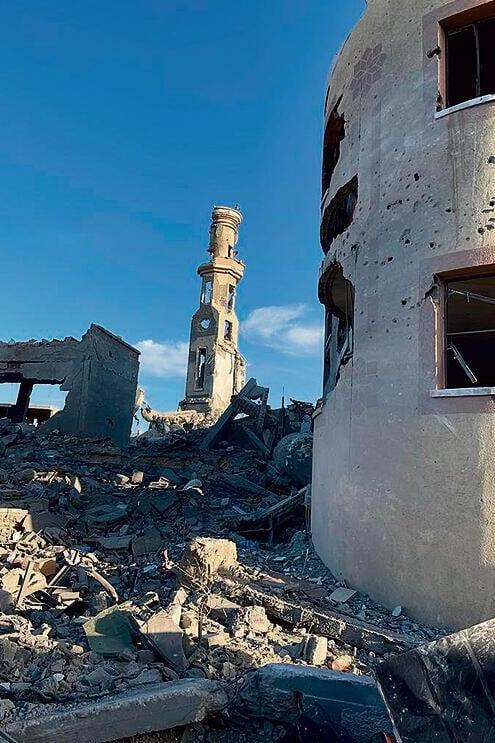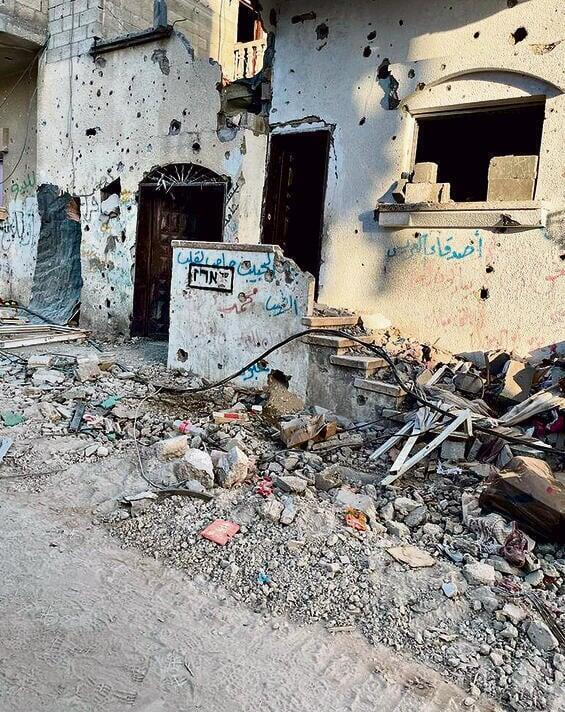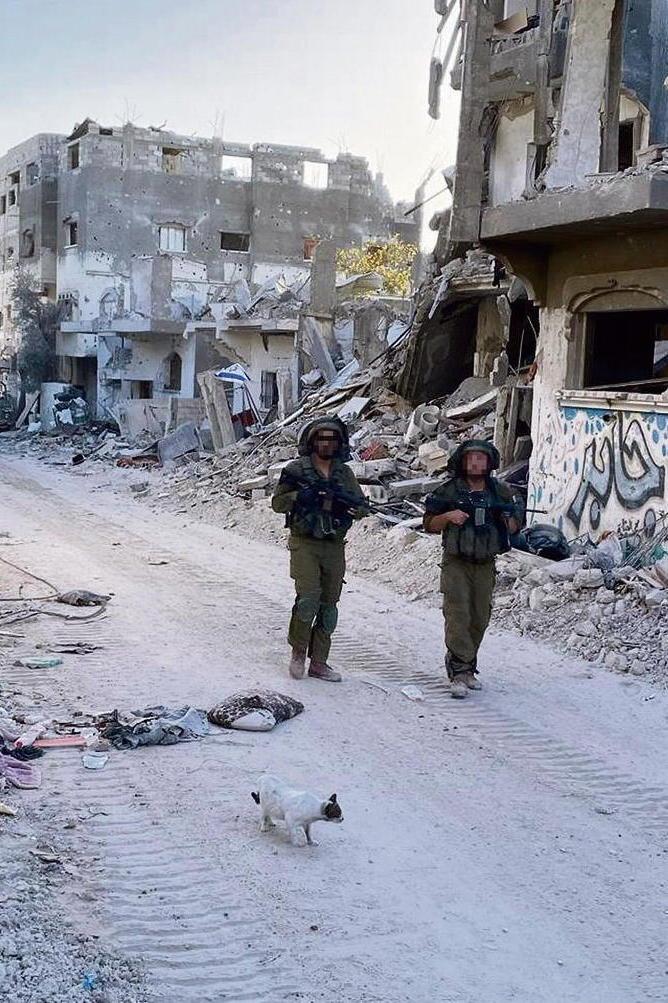Getting your Trinity Audio player ready...
A large explosion was heard from the west, in Beit Hanoun, on Friday. I was hundreds of meters away in an eastern neighborhood of the northern Gaza town. The air was full with the sounds of war from guns, tanks, mortars, artillery and choppers. Moments passed before I realized something unusual had happened. Orders were changed, tanks and APCs moved quickly, leaving a cloud of dust behind. The faces of officers were tense and showed concern.
Read more:
I later learned that a company of soldiers was clearing a tunnel shaft near a mosque and were hurt in the blast of explosives placed there by Hamas. Four died, four others were hurt, two of them critically. The booby trap may have been activated automatically when the force entered the shaft, collapsing the walls.
The dead and wounded were removed in APCs. They passed by us quickly, causing the walls next to us to shake. A chopper waited for them inside Israel, 2 kilometers (1.2 miles) away, to rush them to hospital.
The eastern neighborhood of Beit Hanoun is called the dreidel, because of its shape. The IDF took it over at the start of the ground offensive. Before that, the area was heavily bombed from the air.
In earlier rounds of fighting in Gaza, I saw it from the border. It is positioned on a hill across from Sderot and became a frontline command and control center for Hamas, a convenient launching pad for rockets and mortars and a vantage point to observe Israel. Residents of the town knew they would be the first to be targeted if and when the IDF struck.
There were 35,000 people living there up to October 7. Immediately after the Hamas massacre, most left amid the bombing campaign. When those who remained saw Israeli tanks on the move, they too left. The soldiers could not find one resident, dead or alive, when they entered. Nor did they find any of the hostages. Bein Hanoun was abandoned, by everyone but the Hamas squads hiding underground with huge amounts of munitions and explosive devices. It was supposed to be the calmest arena on Friday, but in war death has its own agenda.
One of the most important battles of Islam, took place at Beit Hanoun 784 years ago, on Monday. Crusaders went there to fight the Egyptian sultan. The crusaders were slaughtered, and the battle precipitated the end of the crusades. The hilltop where the battle had taken place was named Um al Nasser, The Mother of Triumph. A mosque by the same name was built. But the importance of the sight did not stop Hamas from digging tunnels and shafts and filling them with explosives.
I walked along the main road from one end to the other. After the bombings, nothing was left habitable. The mosque was also destroyed after the amount of munitions there was found. Only the minaret remained, tilted like the Tower of Pisa with doves flying through the remains announcing no peace. Chickens, cats and dogs wandered in and out of the buildings looking for food. Leftovers from Hamas and IDF soldiers' rations, Hamas uniforms and clothes left behind, furniture, window frames all lying in the sand and a strong smell of animal carcasses hung heavy in the air.
3 View gallery


The Um al Nasser mosque in Beit Hanoun was filled with Hamas explosives
(Photo: Nahum Barnea)
The entire neighborhood looked like the photos of Berlin in 1945. What the Air Force had not done, the tanks and troops did when they cleared it from Hamas forces. Beit Hanoun will not be habitable after the war. It will either be part of a demilitarized security belt Israel is planning to establish or will have to be rebuilt. "Goldin Avenue," someone wrote in red on one wall, referring to Hadar Goldin who was killed and whose body was taken by Hamas in the 2014 war. Its nice that Hadar was remembered.
The force fighting there is of reservist soldiers commanded by officers on active duty. The previously announced death of the reserve force was premature. The force is made of veterans of elite infantry units and is no less trained and armed than the younger forces. Some, if not all, train once every week, like the Air Force pilots do, and are outstanding in their civilian lives as well, holding leading positions and diverse political views. The best of Israel.
Each company includes an engineer or building contractor. They are called to inspect the buildings to prevent them from collapsing on top of the troops. In one such structure, the force set up their command post for Brigade commander Col. Ido Kass. "The events of October 7 caught me off the coast of Rosh Hanikra, on the border with Lebanon, on my morning swim," he said. "By noon we sent two battalions to the south. By evening we were fighting. These are reservists who fought Hamas terrorists in the fields on the border and retook a position near Nahal Oz."
They lost four men in that fight. "I told my men that with all the rage and the horrible sights that they saw, we were not like the Hamas terrorists. When we captured some, we treated them well. There was no question," he said.
"Hamas had 1,000 men in Beit Hanoun, who were prepared for war. We came from the north, entered at night. The Air Force had bombed tunnels and Hamas was unaware that the ground force was nearing. In military terms, the battle is won when the enemy is unable to act. That was completed in the first phase and then we moved on to the second which was the destruction of their infrastructure and that is what we have been doing in this past week."
Kass showed me a school and hospital in the center of town, both found to contain large quantities of munitions. Some 100 soldiers suffered mostly mild injuries in clashes with Hamas. At least 40 of them returned to the fighting and 11 were hospitalized. "We are dealing with the tunnels and found 12 rocket launchers in the school. We are working slowly and carefully," he said.
I asked one of the officers in the force if the protests that swept Israel before the war had affected the readiness of the reservists and if any of the men had stopped volunteering or training. "No," he said. "Everyone showed up. That does not mean that I and half of the brigade were not on the streets protesting every Saturday night."
"How are things in Israel?" I was asked by the men who had been out of contact with their families for the past fortnight. "You," I said, "are all anyone cares about. You and the hostages."
They said they only hoped that they would be able to complete their mission. I asked what that meant but each one had a different definition.
As the sun went down, some religious soldiers sang Shabbat songs. It was beautiful and sometimes drowned out the sounds of war. The secular troops sat outside drinking coffee and smoking. I found it hard to leave them and return home.



